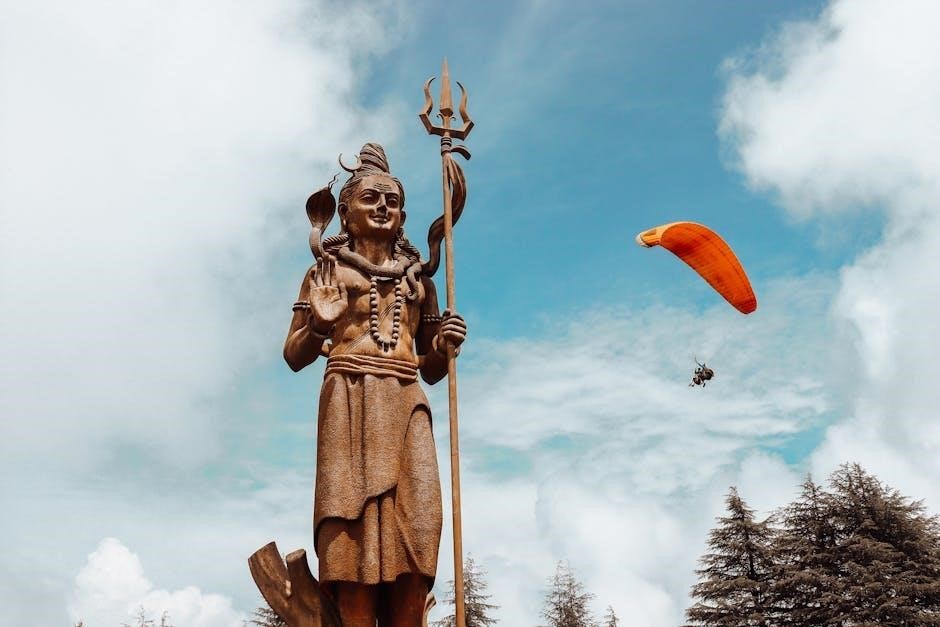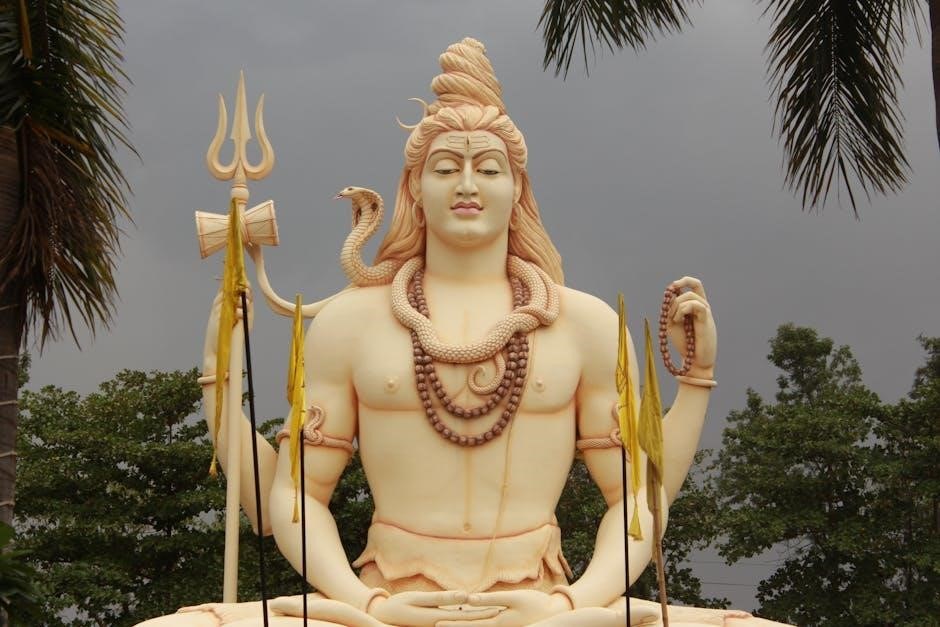Shiva Ashtottara Shatanamavali is a revered Hindu prayer featuring 108 sacred names of Lord Shiva, symbolizing his divine attributes. It is widely cherished in Telugu PDF format for easy access and devotion.
The prayer is a beautiful compilation of Lord Shiva’s names, each reflecting his cosmic significance and divine qualities, making it a powerful tool for spiritual worship and connection.
Overview of the Prayer
Shiva Ashtottara Shatanamavali is a devotional prayer dedicated to Lord Shiva, consisting of 108 sacred names that extol his divine virtues and cosmic significance. Each name highlights a unique attribute of Shiva, such as his benevolence, cosmic dance, and role as the destroyer of evil. The prayer is structured as a lyrical chant, making it easy to recite and meditate upon. It is often recited during poojas, rituals, and personal worship to seek blessings and spiritual enlightenment. The Telugu PDF version of this prayer is widely popular, offering devotees a convenient way to access and recite the verses in their native language. It serves as a powerful tool for connecting with Lord Shiva and experiencing his divine grace.
The prayer’s simplicity and profound meaning make it accessible to all devotees, regardless of their familiarity with complex rituals. It is a cherished part of Hindu devotion, fostering a deep sense of reverence and spiritual growth among those who recite it.
Importance in Hindu Devotion
Shiva Ashtottara Shatanamavali holds immense significance in Hindu devotion as a powerful tool for spiritual growth and divine connection. It is believed to bring blessings, peace, and prosperity to those who recite it with faith. The prayer is often chanted during rituals, poojas, and personal worship to honor Lord Shiva and seek his grace. Each of the 108 names embodies a distinct virtue of Shiva, making it a comprehensive devotion that resonates deeply with followers. The Telugu PDF version has made it accessible to a broader audience, fostering a sense of unity and reverence among devotees. Its recitation is considered a means to purify the soul, attain spiritual enlightenment, and strengthen one’s bond with the divine. It is a cherished tradition in Hindu spirituality, reflecting the timeless reverence for Lord Shiva.
By reciting this prayer, devotees aim to seek Lord Shiva’s protection, wisdom, and blessings, making it an integral part of Hindu religious practices and personal devotion.

Structure and Content
Structured as a list of 108 divine names, the Shiva Ashtottara Shatanamavali in Telugu PDF provides accessible worship content, preserving traditional essence.
The 108 Names of Lord Shiva
The Shiva Ashtottara Shatanamavali contains 108 profound names, each representing Lord Shiva’s distinct attributes and divine essence. These names, such as “Shivaya Namah” and “Maheshwaraya Namah,” highlight his role as the destroyer, creator, and preserver of the universe.
The names are deeply rooted in Hindu scriptures and philosophy, embodying his cosmic significance. Reciting these names is believed to bring spiritual enlightenment, peace, and divine blessings.
In the Telugu PDF version, these names are presented in a clear and accessible format, making it easier for devotees to recite and meditate upon them. Each name invokes a specific aspect of Shiva, fostering a deeper connection with the divine. This sacred list is a cornerstone of devotion, offering a pathway to spiritual growth and inner harmony.
Language and Script
The Shiva Ashtottara Shatanamavali is traditionally composed in Sanskrit, but its Telugu PDF version ensures accessibility for Telugu-speaking devotees. The sacred text is written in the Telugu script, blending cultural and linguistic familiarity with spiritual significance.
This adaptation maintains the original Sanskrit names, transliterated into Telugu, preserving the prayer’s authenticity. The PDF format allows devotees to easily read, recite, and share the Shatanamavali, facilitating widespread worship and devotion across the region. The combination of Sanskrit and Telugu scripts bridges tradition and regional language, making it a cherished resource for spiritual practice and cultural connection.

Benefits of Reciting the Shatanamavali
Reciting the Shatanamavali brings divine blessings, mental clarity, and emotional peace. It strengthens spiritual connection, fostering inner harmony and devotion to Lord Shiva.
Spiritual Significance
The Shiva Ashtottara Shatanamavali holds profound spiritual significance as it embodies the essence of Lord Shiva’s divine attributes. Each of the 108 names reflects his cosmic role, divine qualities, and the reverence he commands. Reciting these names is believed to deepen spiritual connection, fostering devotion and inner peace. The prayer is often recited during rituals and pujas to invoke Shiva’s blessings, seeking harmony and liberation. Its availability in Telugu PDF has made it accessible for devotees to chant and meditate, enriching their spiritual journey and strengthening their bond with the divine.
Emotional and Mental Benefits
Reciting the Shiva Ashtottara Shatanamavali offers numerous emotional and mental benefits. The rhythmic chanting of the 108 names creates a calming effect, soothing the mind and reducing stress. It helps devotees cultivate focus and inner peace, enhancing mental clarity. The prayer also fosters emotional resilience, providing solace during challenging times. By chanting these sacred names, individuals can experience a deep sense of comfort and tranquility, which strengthens their emotional well-being. The availability of the Telugu PDF version makes it easier for devotees to practice regularly, integrating these benefits into their daily lives and spiritual routines.

Downloading the Telugu PDF
The Shiva Ashtottara Shatanamavali in Telugu PDF is easily accessible online. Devotees can download it from trusted sources like stotranidhi.com or vignanam.org for convenient worship.
Availability and Sources
The Shiva Ashtottara Shatanamavali in Telugu PDF is widely available online, ensuring easy access for devotees. Trusted websites like stotranidhi.com and vignanam.org provide authentic versions of the prayer. These platforms offer downloadable PDFs in Telugu, catering to the linguistic preferences of devotees. Additionally, the PDF can be found on other religious and cultural websites, such as Greater Telugu, which specializes in Hindu religious literature. Some versions are also shared by individuals on platforms like scribd.com and archive.org, further expanding accessibility. The PDF is often accompanied by romanized Sanskrit text for broader understanding. With multiple sources available, devotees can easily locate and download the Shiva Ashtottara Shatanamavali in Telugu, ensuring uninterrupted worship and spiritual connection.
Steps to Download
To download the Shiva Ashtottara Shatanamavali in Telugu PDF, visit trusted websites like stotranidhi.com or vignanam.org. Navigate to the section dedicated to Hindu prayers or stotras. Search for “Shiva Ashtottara Shatanamavali” in the search bar. Click on the relevant link, and you will find a download button or link. Select the Telugu version to ensure the correct language format. Once clicked, the PDF will begin downloading. Save it to your device for easy access. Ensure the source is reliable to maintain the prayer’s authenticity. This simple process allows devotees to obtain the sacred text effortlessly for daily worship and spiritual practices.

Cultural and Religious Impact
The Shiva Ashtottara Shatanamavali deeply influences Hindu culture, fostering devotion and spiritual growth. Its recitation strengthens faith, unifies communities, and is integral to religious ceremonies, enhancing worship experiences.
Influence on Devotees
The Shiva Ashtottara Shatanamavali profoundly impacts devotees, deepening their spiritual connection and fostering devotion. It is believed to bring peace, prosperity, and liberation, strengthening faith in Lord Shiva. Many followers recite it during daily poojas or special ceremonies, finding solace in its sacred verses. The prayer’s rhythmic and meaningful structure makes it accessible and heartfelt, allowing devotees to express their reverence effortlessly. Additionally, it serves as a unifying force, bringing communities together in shared worship and reinforcing cultural traditions. Its influence extends beyond individual devotion, contributing to a collective spiritual upliftment and emotional well-being.
- Strengthens spiritual faith and devotion.
- Brings peace, prosperity, and liberation.
- Enhances emotional and mental well-being.
- Unites communities through shared worship.
Role in Religious Ceremonies
The Shiva Ashtottara Shatanamavali holds a significant role in religious ceremonies, often recited during poojas, festivals, and special rituals. It is considered auspicious, invoking Lord Shiva’s blessings for prosperity and happiness. Priests and devotees alike chant these 108 names to purify the environment and seek divine grace. The prayer is integral to ceremonies like Shiva Abhishekam, where it accompanies the ritual bathing of the deity. It is also recited in temples, homes, and community gatherings, fostering a sacred ambiance. Its inclusion in religious events underscores its importance in Hindu worship traditions, making it a cornerstone of devotional practices.
- Integral to rituals like Shiva Abhishekam.
- Recited in temples, homes, and gatherings.
- Purifies the environment and invokes blessings.
- Enhances the spiritual ambiance of ceremonies.
The Shiva Ashtottara Shatanamavali is a deeply revered prayer, offering a profound way to connect with Lord Shiva through his 108 divine names. Its availability in Telugu PDF has made it accessible to millions, fostering spiritual growth and devotion. Reciting this prayer is believed to bring blessings, peace, and liberation, making it a cherished practice in Hindu spirituality. Its cultural and religious significance continues to inspire devotees, ensuring its timeless appeal. By downloading the Telugu PDF, one can easily incorporate this sacred text into daily worship, strengthening their bond with the divine. It remains a beautiful expression of faith and devotion to Lord Shiva;